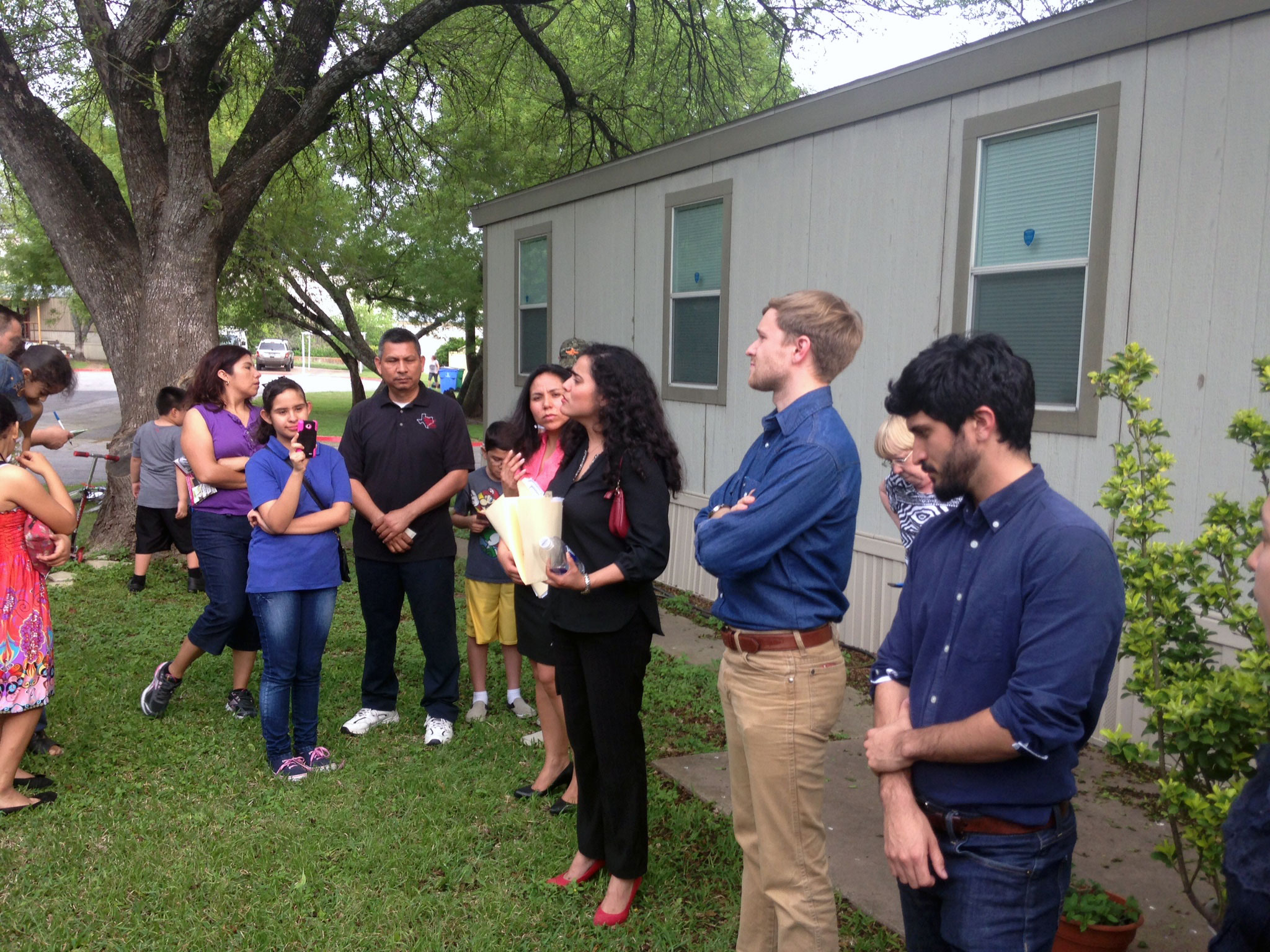This story originally appeared on KUT News.
Residents at Stonegate Mobile Home Park in North Central Austin say they can’t stand their living conditions anymore.
David Jaimes, one of the residents, says they live in constant fear of retaliation. Jaimes says every time neighbors ask management to fix something in the community, management threatens to evict them, or calls the police.
Last month, the community learned that another neighbor, Otilio Cedillo, and his family had been without power for a couple of weeks. Cedillo has cancer. His youngest son has asthma — the heat inside their mobile home was unbearable. They couldn’t use the fridge to store their medications, but management refused to fix the situation.
They decided enough was enough, and about 30 neighbors gathered at the manager’s office to plead that she restore Cedillo’s power.
Austin City Council member Greg Casar was also there. He came with one of his aides, Braden Latham-Jones, a former community organizer who’s fluent in Spanish.
As the neighbors waited for management to meet with them, Latham-Jones asked them, “Who is scared?”
Virtually every hand went up. Veronica Garcia-Rodriguez, the property manager, eventually came out — but only to tell the gathered crowd to please leave.
She did not talk to the neighbors, but she did call the police. She also called the community’s security officer, who stood by the door, to ask people to leave.
“I’m the city council member for this area,” Casar told the officer. “And I just have a concern about the health of one of my constituents — ”
Garcia-Rodriguez cut him off. “He can’t speak with anybody,” she said.
The neighbors and Casar left the office. But why had Cedillo’s power been turned off? Garcia-Rodriguez’s office hasn’t returned any of KUT’s calls, nor did the corporate offices of RHP Properties — the owners — in Michigan.
Garcia-Rodriguez would not speak with KUT in person for this story.
Just minutes after Garcia-Rodriguez called, four APD patrol cars arrived at the property.
Officer Jason Murray addressed Gloria Cordova, the new president of the neighborhood association.
“What was expressed to me was they felt it was a little bit aggressive – the whole group coming up, and that’s why they called us out —”
“Here’s the thing, though, officer,” Cordova said, “and I apologize for interrupting you. We really do appreciate you guys coming so fast, [but] we’ve had break-ins here at the end of January and early February, and people waited five, six, seven hours for someone to come make a report. We hope that in the future if there’s something more important than residents coming to the office you guys can come as fast – because that was great that you were here that fast – you know?”
That visit by the police went in the records as a “disturbance or other.” Through an open records request, KUT found that in the last year APD visited that community for a “disturbance or other” a couple dozen times.
Kathy Stark with the Austin Tenants’ Council says mobile home communities are in a unique situation – many of the laws that protect homeowners almost certainly do not apply to mobile home owners. The same goes for the laws that protect tenants, because mobile home owners only rent the land their homes sit on. They are in a sort of legal limbo, and Stark says that’s why it’s easy and not entirely illegal for management to use threats of eviction or other intimidation.
“So, here you are, you know?” Stark says. “Upset about your water bill. Next thing you know, you get arrested, then they can give you notice to vacate for disturbing the peace of the property and take you to court and, are you going to have an attorney represent you? Probably not. It’s already unequal.”
At Stonegate Mobile Home Park and at North Lamar Community Mobile Home Park — the two communities that now have homeowner’s associations — most of the residents are Spanish speakers, and many are undocumented. They say they never complained about the rules even though some seem abusive. For instance, at Stonegate, anything that’s on a porch is removed by management — a bike, a grill, furniture as residents are in the process of moving in or moving out — stuff is tossed and residents get a $50 fee. The city’s 311 records show residents made anonymous calls reporting these types of situations. They also reported being without running water for days – with no explanation from management – and not knowing what to do.
“If you are an apartment dweller and you don’t agree with the policies, when your lease is up, you pick up and move,” says Stark. “When you buy a manufactured (mobile) home and put it in a person’s land – it’s not that easy – there’s a huge difference in packing up your clothes and your dishes and moving and trying to move your home.”
Attorney Robert Doggett filed a suit this week on behalf of the North Lamar Community Mobile Home Park. He says Texas law may not always favor mobile home owners, but they do have some protections.
“And so, I wouldn’t jump to conclusions that, ‘these residents really don’t have any recourse, it’s too bad, the Texas Legislature has to change the law’ – that’s not the case here,” Doggett says.
Attorneys for the North Lamar Park are taking things seriously and are working with Doggett to better the quality of life of residents there. Something similar happened at Stonegate. APD officers listened to the residents’ concerns and offered to step up their patrols — not just come when called by management. In the end, they exchanged phone numbers with residents.
The next day, power was restored at the home of Otilio Cedillo.















